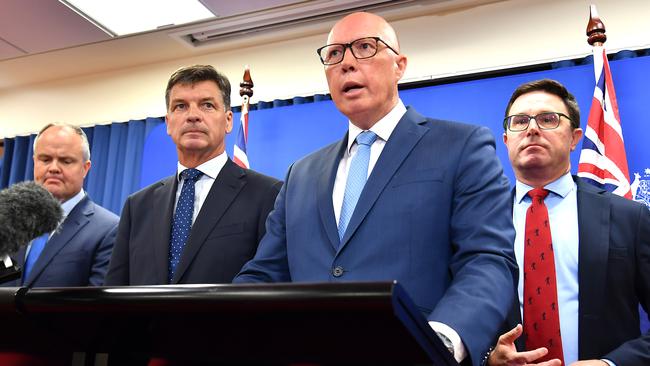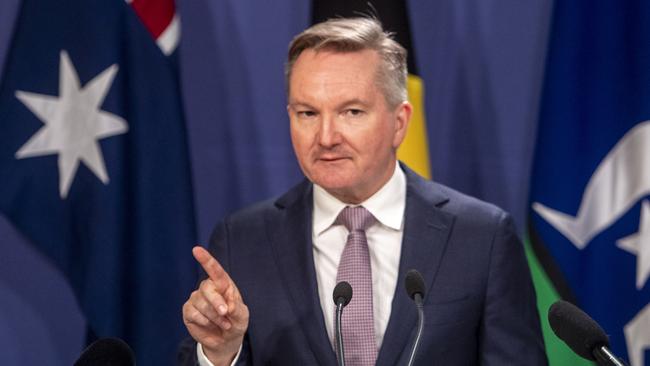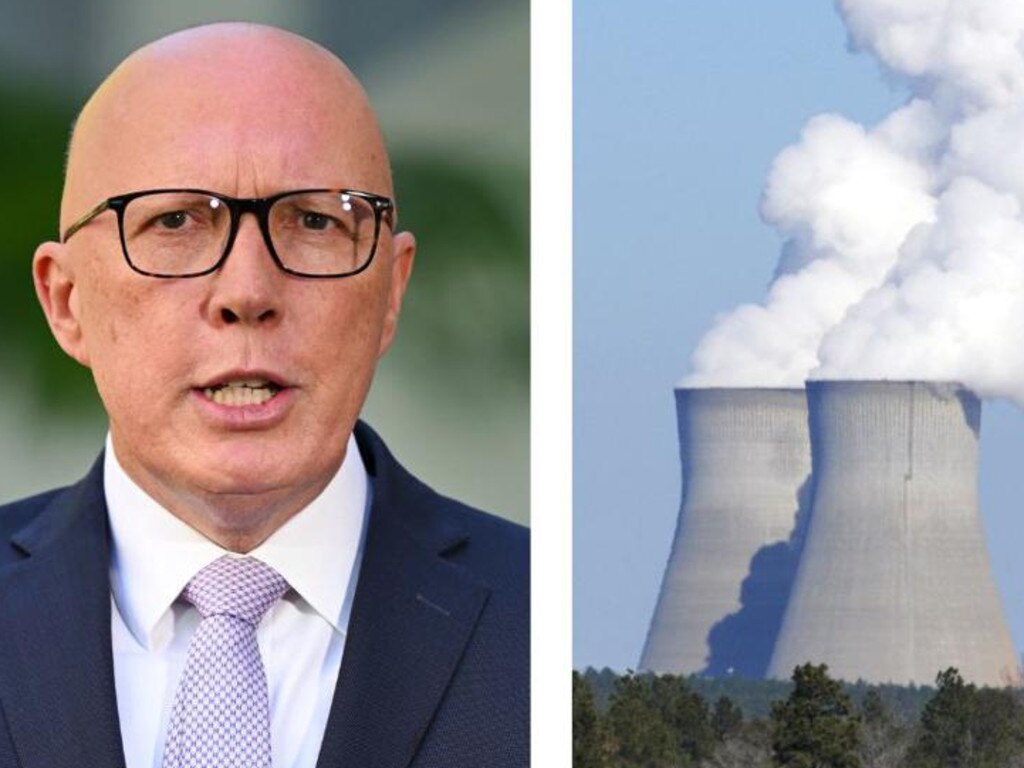Defiant Peter Dutton ready for nuclear scare campaign from Labor
Peter Dutton will ‘stare down’ nuclear scare campaigns and seek an election mandate to compel sceptical premiers and business chiefs into fast-tracking his plan to build seven nuclear power plants.

Peter Dutton will stare down nuclear “scare campaigns” waged by Labor, the unions, Greens and clean energy groups and seek an election mandate to compel sceptical premiers and business chiefs into fast-tracking the Coalition’s plan to build seven nuclear power plants.
The Opposition Leader on Friday conceded bipartisan support would make timelines bringing nuclear generation online from 2036 “much more achievable”, amid criticism his $331bn energy plan failed to address near-term cost relief and power security for households and businesses.
Mr Dutton’s net-zero emissions by 2050 blueprint, which requires 65 per cent of ageing coal-fired power stations to keep operating until nuclear comes online, was attacked by Anthony Albanese and Chris Bowen as “reckless, fantasy, a con job, dangerous and risky”.
As business leaders, energy retailers and generators raised questions about “heroic” Coalition assumptions based on Frontier Economics modelling and concerns over cost blowouts and delays overseas, Mr Dutton said his plan would “underpin the economic success of our country for the next century”.
He said he would “have more to say about our energy policy in relation to the near term, because it’s incredibly important that people get help now”. The Liberal leader said he believed if Mr Albanese lost the election, there could be bipartisan support on the “vision that we put to the Australian people”.
“The independent costings that we’ve got (shows it will be) 44 per cent cheaper under the Coalition’s energy plan than Labor’s energy plan, over the period of implementation, and lower emissions from 2050 on under our plan,” Mr Dutton said. “The government has ramped up electricity prices after promising to reduce it by $275, and people are now paying $1000 more than what Labor had promised.”
Mr Bowen, the Energy Minister, identified “three fatal flaws” in the nuclear modelling, including Coalition claims costs would be lower because Australians would use less power, that costs did not reflect real-world experience and that there was “no need to build transmission to get power into homes”.
“If they are to be taken seriously, they need to outline exactly what transmission lines they would cancel. It doesn’t matter how you produce electricity, you’ve got to get it to homes and businesses, and that takes transmission. And the transmission lines are full and need to be duplicated regardless of whether the power comes from renewables or nuclear,” Mr Bowen said.

As Coalition MPs expressed frustration that nuclear costings were publicly released before the partyroom was briefed, senior ALP operatives told The Weekend Australian: “We think the election debate is around economics.” Labor is planning to ramp-up attacks about the lack of detail underpinning Mr Dutton’s policies across energy, tax and migration policies.
The Coalition’s preferred “progressive” scenario assumes a larger Australian population will require less energy than planned under the current “step-change” scenario, fewer people will be driving electric vehicles despite manufacturers indicating a phase-out of internal combustion engines, and that green hydrogen does not develop as expected.
Under the Australian Energy Market Operator progressive scenario, after adding 38 per cent of nuclear in the grid, the energy system cost would be $331bn compared to $437bn without nuclear. Under AEMO’s step-change scenario, adding nuclear would cost $446bn compared to a base renewables-anchored scenario of $594bn. The Coalition’s proposed grid plan, which will dramatically scale back costs associated with transmission upgrades and projects connecting renewables, includes 38 per cent nuclear generation, 32 per cent wind, 17 per cent solar, 9 per cent hydro and 4 per cent storage capacity.
Mr Dutton says the Coalition would build, own and operate seven nuclear plants at decommissioned coal-fired power station sites in five states, including two small modular reactors and five larger power stations.
Grattan Institute energy and climate change program director Tony Wood, who believes it is time for Australia to be having an “adult discussion about nuclear energy”, said the Coalition’s cost comparison was not like-for-like.
“The progressive change is probably the most likely of the two given where we are at. That $263bn difference becomes more like $100bn, or a 25 per cent difference rather than a 44 per cent difference in cost,” Mr Wood said.
Amid growing expectations of an early election, senior Labor strategists said “the modelling is a joke … you can’t talk about a 2050 plan and not have a position about the impacts for people”.
“We will be saying that under the Coalition plan, costs will go up by $1200 a year. We will be focusing on the fact they do not have an alternative plan, while at the same time are opposing energy bill relief for households. We will focus on the delays and cost of nuclear and the cost to households and businesses. The election argument will be an economic one … under Peter Dutton’s nuclear reactor scheme you will go backwards, you will be worse-off,” an ALP source said.
Senior Liberal operatives said they were prepared for a “scare campaign” from Labor, the Greens and others, and were confident that Mr Dutton could unite premiers and business leaders around nuclear if he wins the election. “I suspect Labor’s negative campaign is more likely to focus on health rather than nuclear. But we’re not complacent that Labor could stimulate the nuclear issue as a scare campaign,” the strategist said. “We’ve seen evidence, certainly in regional areas, that there is good support for the concept of nuclear power. To date, Peter Dutton has had the better of the debate on energy and we will prosecute hard on the case that Labor broke its $275 lower power bills promise and made the cost-of-living worse, while Peter and Ted (O’Brien) have a longer-term vision for the country.”
A teals campaigner said while voters in metropolitan seats Mr Dutton hopes to win aren’t anti-nuclear, they are also very pro-renewables. Recent polling shows the top issues in teals seats are housing affordability, cost-of-living integrity and climate change.
“The problem for the Coalition is disentangling themselves from a pretty concerted campaign attacking renewables. Ultimately, nuclear will not change the contest. There may be some cut-through amongst younger male progressives but there is likely more interest in tax cuts and cost-of-living,” the campaigner said.
Queensland LNP Premier David Crisafulli, who hasn’t spoken to Mr Dutton about nuclear energy since winning the October state election, said his position had not changed and he would not remove state bans on nuclear.
“Canberra will have a debate on energy, my focus is doing what I’ve said for the people of Queensland,” Mr Crisafulli said.








To join the conversation, please log in. Don't have an account? Register
Join the conversation, you are commenting as Logout